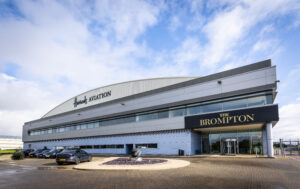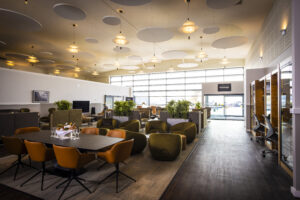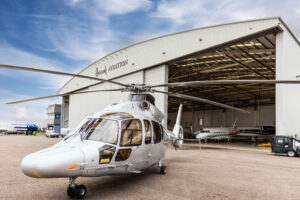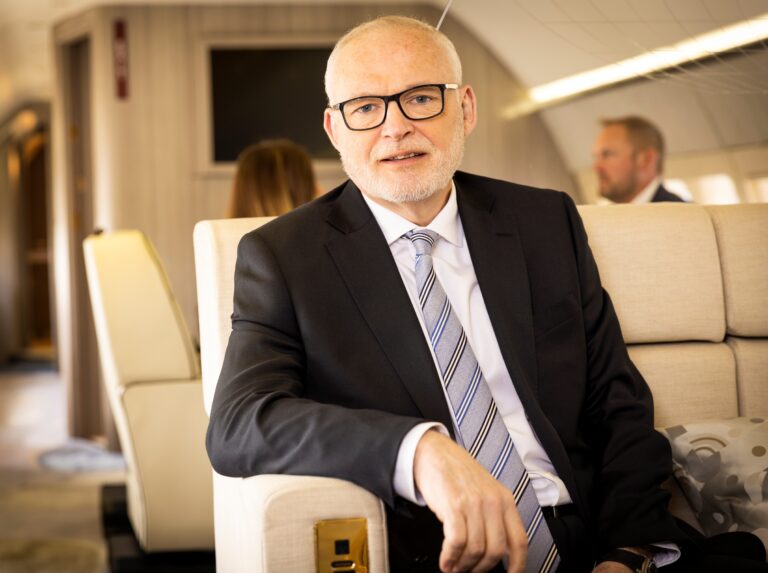Sitting in the newly renovated Charles Henry Suite at the company’s London Luton FBO, Paul Norton, managing director at Harrods Aviation explains how he entered the industry. “I got into business aviation entirely by accident,” he says. “I am a trained and qualified accountant and I worked in practice up until the late 1990s. Then I worked for a couple of logistics businesses.
“The last logistics company I worked for was the biggest container shipping line in the world. In 2005, they bought another company and my role moved. I became the head of finance for the combined UK and Ireland logistics business. After about five years I got asked to go and work in what was the UK head office doing some project work that was more business orientated than finance orientated. After successfully completing two projects in 2006 I decided to look around for a new job.
“I met a headhunter who said he had a job for me at Harrods Aviation. I knew nothing about business aviation at all. I couldn’t have told you what the acronym FBO meant, and I didn’t even know that Harrods Aviation had a base at either Luton or Stansted. I knew nothing about it. But I got the job as the finance director.”

Norton was the finance director between 2007 and 2012. Near the start of his time at the business, in 2009 Harrods, including Harrods Aviation, was sold to Qatar Holdings. “Immediately after that I became the interim managing director,” explains Norton, whilst he covered a maternity absence.
In 2012, the former owner decided to build a new business at Stansted called Fayair.
Norton got the job as managing director permanently in 2012. “It was almost by accident,” Norton jokes, “You could say I was the last man standing.”
It was more likely that Norton was a safe pair of hands for the company. He had been doing the role through most of that year already.
“I was entirely used to the rhythms of what was going on at the company and I’d got my head around what business aviation was all about,” he says.
“I understood the high levels of service that customers expected and how different the service level was to commercial aviation.
“We have a very high touch service level here. If you bring your aircraft to us, you will be looked after from the moment the wheels are down and the doors open, to when you get in your car and you leave the premises or in reverse.
“The moment you arrive you are greeted, and somebody stays with you through the whole time you are with us. That’s not how I understand other companies work either here in the UK, around Europe or the rest of the world.”
In a full circle moment, last year Harrods purchased Fayair and reopened it as The Brompton.
“Adding the extra premises at Stansted last year was a major milestone for the company. It was immensely satisfying to get that over the line. It has been a real success. It has also been really gratifying to see how the staff came along and integrated themselves into our way of doing things. That’s been great,” enthuses Norton.
“We hope we see more of the same for the future,” he adds. “We want to secure our future at both London Luton and Stansted Airport.”
Airport access challenges

In common with other companies who operate out of large international airports, Norton explains there are often challenges with working with the airport operators.
“When working with a major airport you are essentially less important than its commercial operations because that is its bread and butter, whereas we are more ad hoc,” he explains. “So, there is always a negotiation when it comes to runway access.”
Another issue that Norton highlights is the task of changing the public perception of business aviation.
“The US sector is much better at making the economic argument than we are. They have campaigns that explain how the people who are flying these aircraft are making money for the economy, they are paying taxes and they are creating jobs.
“I think there is also a challenge around sustainable aviation fuel. Is it as sustainable as people claim it can be? You wouldn’t want to be using feedstocks to make SAF that should be making foodstuffs. I guess there is a balance the industry needs to find. And the high cost of it at the moment, has meant we haven’t had much client uptake.
“The aircraft that business aviation tend to use are much more fuel efficient but it’s convincing the public of that as well as convincing the regulators that is hard.”
Difficult but rewarding
When discussing whether the industry does enough to entice people into the sector, Norton highlights how difficult working in business aviation can be.
“We have a wide age range here at Harrods. We go from 18 to 75 in terms of people who work for us. There are jobs out there if you want to work in business aviation, but it’s not easy work,” says Norton.
“You are dealing with high-net-worth individuals and their representatives, who can be very demanding, because they want what they pay for and what they are used to getting. They expect a high level of service, high level facilities and a good standard of service too.

“I don’t think you necessarily need to be passionate about aviation, but any work experience you can get will help. Get yourself on a course about the industry, study hard, but remember you need a high customer service ethos to be in our industry, because it’s not easy. That applies to every role. This is an industry for all shapes and sizes, there are the people in the offices, there are people out on the ramp, people in the lounges or people on reception. In the wider context, there are more jobs than just pilots and flight attendants. I always say to people, there is always more than one way to get to where you want to get to. So, if at first you don’t succeed in one route, there will be another route.”
After all, Norton’s journey into business aviation was far from traditional. “I’m still a numbers guy,” he says. “We’re very service orientated business but we’re driven by key performance indicators in the background. We like our data here at Harrods Aviation.”





